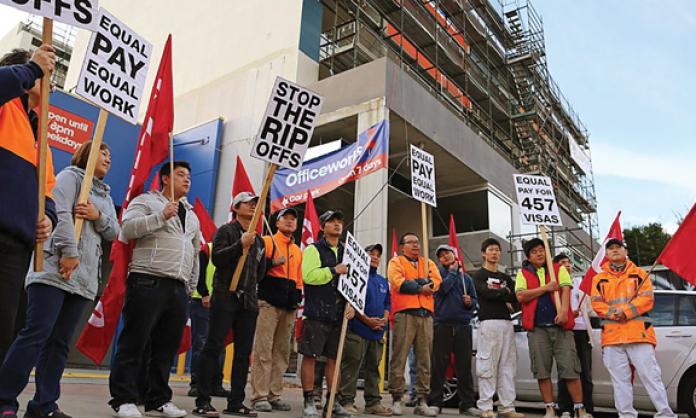“The coalition government – ensuring Aussie workers have priority for Aussie jobs – abolishing the 457 work visa.”
You can find these words on immigration minister Peter Dutton’s website – superimposed over a picture of a giant muddy backhoe, digging dirt in some remote-looking location.
The first weird thing is, not one category of machine operator or driver was eligible for a 457 visa, even before Dutton’s announcement. So the backhoe picture is simply part of the theatre, a fictional prop for a bullshit so-called “solution” to a discriminatory, anti-worker visa category of the Liberals’ own creation. The effect of this theatre is to leave the core of the problem intact, and in some ways make it worse, while kicking off a wild bout of flag waving to mask more severe threats – such as the Turnbull government itself.
Even the least attentive media commentators have picked up on the large element of make-believe in Dutton and Turnbull’s breathless announcement that 457 employer-sponsored visas will be “abolished” in March next year. For starters, there’s the fact that 457 visas will be instantly replaced by two new visas that work on exactly the same principles of employer sponsorship (the “Temporary Skills Shortage” or TSS visas).
Much media, union and political commentary has mocked Turnbull and Dutton for posing as mighty friends of the working class by saving Australia from some alleged influx of employer-sponsored goat farmers, magistrates and tribunal members – some of the occupational categories that employers can no longer sponsor under these latest “reforms”.
The bullshit goes much deeper than this, however.
The threat to workers in Australia from the 457 visa, and similar schemes, has never depended on the size of occupational categories under which workers can be sponsored. Rather, the problem with 457 visas is built into the visa itself.
Employer-sponsored temporary work visas such as the 457 severely limit the most fundamental right that a worker can have under capitalism – our right to quit one job and search for another. This right is what is meant to mark out capitalist “free” labour from slavery, serfdom and other forms of bonded labour. The 457 visa is a serious attack on that right. Any worker employed under a 457 visa who is sacked or who leaves their job has a limited period – currently just 60 days, reduced from 90 days late last year – to find a new employer (who must be approved to employ workers on a 457 visa) or face deportation.
It’s this that gives the whip hand to the employer in what is already an unequal relationship. Throughout history and around the world, when a worker depends on the boss for their immigration status, the door is wide open for gross exploitation, regardless of the supposed protections built into the visa.
So it’s no surprise to find widespread abuses of workers on 457 visas, or on the “working holidaymaker” 417 visas, in which an extension of the visa depends on regional or rural employers attesting that the worker has completed 88 days’ work in primary industry or construction. Similarly, workers on student visas face sharp restrictions on the number of hours that can be worked. To make ends meet, international students are often forced to work beyond their visa limitations, pushing them into the jobs “black market” and leaving them open to exploitation. And workers on seasonal worker programs can be employed only by a restricted group of bosses, limiting their ability to quit bad jobs and find new ones. In all of these cases, restrictive visas along with employer self-monitoring and “light touch” regulation (which amounts to the privatisation of the border) lead to gross and systematic exploitation.
The solution isn’t to keep workers out – it’s to have full work rights for all migrant workers, dramatically reducing the scope for employer coercion. At one stroke, this would significantly lessen the pressure that the exploitation of migrant workers puts on the whole labour market. However, this is exactly not what is on the federal government’s agenda in these latest “reforms”. In 2006, Liberal then immigration minister Amanda Vanstone gloated that the 457 visa “undermines the unions’ ability to exploit high wages amid the skills shortage”. The ruling class want to keep it that way, which is why fundamental reform or actual abolition of restrictive, anti-worker visas is not on the cards from either major party, despite the ritualised huffing and puffing.
The changes announced by the government aren’t just political theatre, however. One of the better informed commentators, journalist Peter Mares, points out that the Dutton-Turnbull changes are “likely to make the pathway from temporary to permanent status longer and harder – or, in some cases, to close it altogether”. A recent Productivity Commission report notes that the average migrant going through a “multi-step” migration process already takes 6.4 years, and more than three visa grants, before they become a permanent resident.
That’s a huge amount of time to survive as a precarious worker on various types of exploitative visas – and it’s about to get longer. Tighter English language requirements, a new requirement for two years’ work experience before getting a temporary visa, and the fact that workers on temporary employer-sponsored visas will have to wait three years before applying to be sponsored for a permanent visa, up from the current two years – all of this will lead to a longer period as a precarious worker. As Mares points out, the result will be a larger body of migrants who live, work and pay taxes without “accruing any of the rights and entitlements that come with membership of the political community”.
This is obviously an attack on the migrants themselves. And by extending the period in which migrants are tied to their boss, it facilitates gross exploitation and wage cutting for workers on temporary visas. The point of this, as Vanstone explained, is to produce downward pressure on wages which, the ruling class hopes, would leave all workers worse off.
However the primary motive of the government’s pronouncement on 457s – and the accompanying frenzy of flag waving, tub thumping and fake memes featuring backhoes – is political. The 457 issue was deliberately chosen to kick off a renewed wave of government-sponsored anti-immigrant and anti-Muslim hysteria, two weeks out from the budget. The government wants to use the 457 issue to distract from its attacks, and to convince us that a vicious political campaign against migrants and Muslims is somehow in workers’ interests. As usual, with anything that comes from Turnbull and his gang, nothing could be further from the truth.











